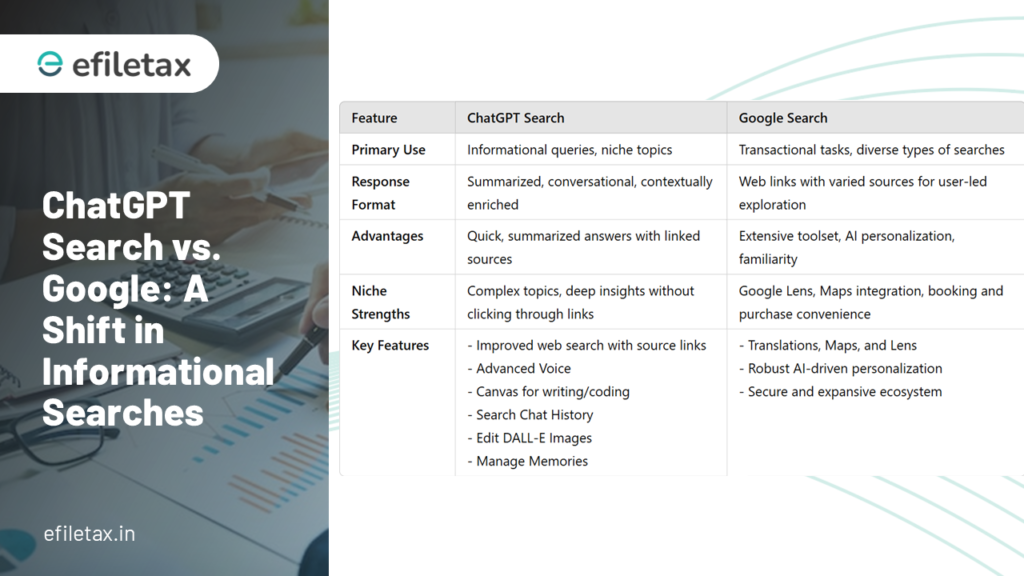
In a digital world dominated by Google Search, it’s hard to imagine a contender that could challenge its supremacy. However, recent updates to the ChatGPT search feature seem to be altering this landscape. This blog delves into the competition between Google and OpenAI’s ChatGPT Search, offering insights into why Google might need to look over its shoulder for the first time in decades.
ChatGPT Search: A Compelling Alternative
Today marks the first time that ChatGPT’s search feature entirely replaced my reliance on Google for research. During a 45-minute writing session, I didn’t feel the need to switch to Google—a statement I didn’t think I’d make so soon. Previously, I even drafted a post explaining why I still need Google for information gathering. Now, that draft seems irrelevant.
The latest iteration of ChatGPT Search has reshaped my research habits, offering convenience, accuracy, and most importantly, an enriched conversational experience. Here’s how.
ChatGPT vs. Google: Use-Cases and Gaps
Of course, Google still dominates when it comes to transactional searches—like booking travel, buying products, or using tools like Google Lens for translations and object scans. But for purely informational searches, OpenAI’s improved web search is highly competitive.
One noticeable area where ChatGPT’s search excels is for niche topics and quick understanding of complex information. Instead of presenting a series of web pages, it pulls context from a variety of credible sources, summarizes it, and delivers a nuanced response.
That said, fact-checking remains a key part of my process. ChatGPT’s responses can be thorough, but I do sometimes double-check using Google to verify if there’s any “hallucination”—a term used for AI-generated inaccuracies. Interestingly, while these inaccuracies do occur, in many cases, they are easy to identify.
Google Search: Where It Shines
Despite the advancements, Google has an undeniable edge in specific areas. Transactional tasks like booking tickets, making purchases, or even performing translations are still better on Google. Similarly, the diverse types of queries you can execute using Google’s powerful ecosystem remain unmatched—for now.
Moreover, Google’s familiarity and vast toolset, such as Google Maps integration, continued innovation with Google Lens, and ongoing development in AI-driven personalized search, provide compelling reasons to stay.
New Features of ChatGPT You Should Know
- ChatGPT Search: Offers improved web search capabilities with quick answers and linked web sources for credibility.
- Advanced Voice: Available on desktop apps, offering richer interactions for both macOS and Windows.
- Canvas: The new writing and coding space in ChatGPT lets you edit, adjust, and collaborate directly.
- Search Chat History: Makes searching through your previous interactions easy.
- Edit DALL-E Images: Now possible on web and mobile platforms, making image customization much more accessible.
- Source Linking: Responses now include links to their original sources—click to learn more.
- Manage Memories: You can view and delete specific memories or even clear all data for a fresh start.
ChatGPT Search vs Google AI Overview: A Simplified Guide
| Feature | Description | Relatable Example | Q&A |
|---|---|---|---|
| 1. ChatGPT Search | Quick answers with relevant web sources and links, helping users avoid switching to Google for informational needs. | Researching a topic in minutes with reliable sources provided. | Q: Does it replace all Google searches? A: No, it complements for fast answers but not for transactions or actions. |
| 2. Advanced Voice | Available on macOS and Windows; now users can interact with ChatGPT through voice commands. | Using voice to draft a quick note on your computer. | Q: Can I use it on mobile? A: Yes, available on iOS and Android, too. |
| 3. Canvas Feature | A space to write and code with suggestions for edits, adjusting text length, and offering real-time feedback. | Editing a report or code directly with instant feedback on clarity and length. | Q: Is it helpful for students? A: Yes, ideal for improving academic writing. |
| 4. Chat History Search | Users can search past conversations, making it easy to retrieve previous topics or answers. | Looking up previous advice on a project without re-asking. | Q: Can I search old chats? A: Yes, available for all stored chats. |
| 5. Edit Images with DALL·E | Users can edit images directly within ChatGPT on both web and mobile, offering a creative boost without additional software. | Quickly adjusting a social media post image on your phone. | Q: Does it work on all devices? A: Yes, accessible on web and mobile apps. |
| 6. Go Straight to the Source | Each response includes sources like news articles or blog posts, giving users transparency and access to the original information. | Clicking on a cited source to read the full article on a legal update. | Q: Can I trust the sources? A: Yes, links come from credible sources. |
| 7. Delete Specific Memory | Users can now manage memory by viewing, deleting specific memories, or clearing all stored memories from their settings. | Removing a specific chat memory for privacy. | Q: Is it permanent? A: Yes, memory deletion is final. |
Conclusion: A New Dawn for Informational Searches?
We live in intriguing times. Who could have imagined a world where Google’s search dominance would face such a serious challenge? ChatGPT’s new features mark an incredible shift, especially in informational searches, where the competition is heating up. As it stands, ChatGPT might not yet replace Google completely, but it sure has made a strong case for itself as an alternative.